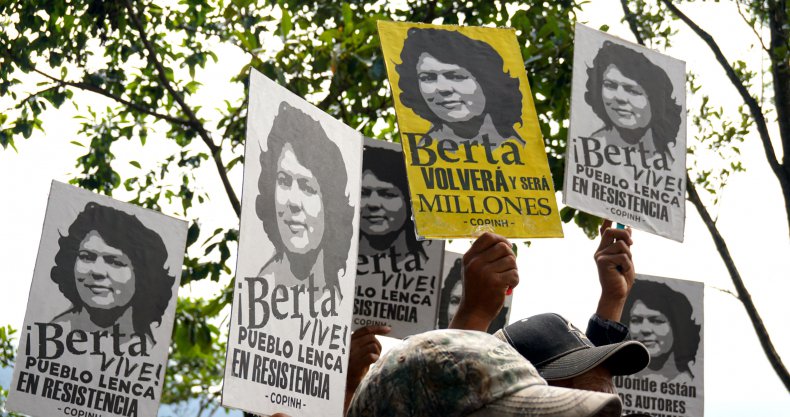Today is second anniversary of indigenous activist Berta Caceres’ assassination

By Elizabeth McSheffrey National Observer
In Honduras, beloved Indigenous activist Berta Cáceres is hailed as a “revolutionary” and martyr. A shocking investigation now reveals that the senior executives of a Honduran company may have been intricately involved in her murder.
Seated in a jostling bus on the winding road to Tegucigalpa, journalist Sandra Maribel Sanchez reflects on her dear friend Berta Cáceres. Her expression is hardened — showing a resolve that has overtaken her sadness.
As high school students in the 1980s, Sanchez and Cáceres would attend “underground” student activist meetings, sometimes in Cáceres’ hometown of rural La Esperanza. Trailblazers in their day, they would talk about feminism, Indigenous rights and state corruption at a time when Honduras, at the urging of the U.S. government, had adopted a national security regime that targeted internal subversion and dissent.
Sanchez, now 55, would go on to become the second female Parliamentary journalist in Honduran history, have her own talk show and direct a radio newsroom. Cáceres would co-found the Civic Council of Popular and Indigenous Organisations of Honduras (COPINH), and lead a 20-year campaign against the Honduran state selling ancestral Indigenous lands to foreign companies.
Both women faced regular death threats. In the end, activism cost Cáceres her life.
“We learned from her that when you have a dream you have to go after it and work for it, regardless of the risks,” Sanchez told National Observer after a visit with Cáceres’ mother and daughter in La Esperanza.
“We also learned that you have to have an international forum to make this known. Before Berta got the Goldman Environmental Prize, the major media coverage would talk about troublemakers coming to block the highway and roads. However, there were colleagues who worked for international press… who had a better idea of what was germinating.”
Murdered in cold blood
The prestigious Goldman Prize is awarded to one grassroots environmental activist from each of the world’s six geographic regions annually, and its past recipients include Kenya’s Wangari Maathai, Baltimore’s Destiny Watford and Cambodia’s Leng Ouch.
Cáceres was gunned down in her home on March 3, 2016, after years of pushing back against the Agua Zarca Dam — a massive hydro project slated for construction along the sacred Gualcarque River in Río Blanco. The Lenca people, of whom she was a member, depend on the river for agriculture, and believe its waters are inhabited by the spirits of five young female river guardians.
The struggle earned Cáceres international acclaim and turned her into a symbol of hope and defiance in Honduras. Many activists young and old cite her as the source of their inspiration today. Her murder sparked protests across the country, along with international headlines.
In response to the tragedy, President Juan Orlando Hernández called the killing a “crime against Honduras.” His government, which supported construction of the Agua Zarca Dam, then falsely claimed — according to The New Yorker — that it was working with the F.B.I. to uncover the assassins. Then, it rejected calls for an independent investigation by the Inter-American Commission on Human Rights, as it launched its own process through the attorney general’s office.
Speaking in La Esperanza, Zúniga charged that the Hernández administration made “no effort” to bring justice to her mother’s killers. With help from the Center for Justice and International Law, her family chose five international lawyers to conduct their investigation, separate from the government’s task force. Their independent report was released in October 2017 — just days after Zúniga met Sanchez and other leaders in the Río Blanco forest base.
Orders to intimidate
Obtained by The New York Times, the report suggests that an elaborate plot to kill Cáceres was months in the making and tied to senior executives of Desarrollos Energéticos S.A. (Desa), the private Honduran company behind the dam. Desa has two major shareholders — Potencia y Energia de Mesoamerica, a Panama-registered company, and Inversiones Las Jacaranda, which is owned by one of Honduras’ most powerful business families.
The New York Times reported that the lawyers’ group reviewed roughly 40,000 text messages retrieved by the Honduran government from cell phones belonging to Desa employees. Those messages reveal that orders to threaten the COPINH, the group co-founded by Cáceres, came from inside the company. Among eight suspects in custody now is a former Honduran Army lieutenant who directed the company’s security until mid-2015.
The case is still open today, although Desa has repeatedly denied its involvement.
In the wake of Cáceres’ murder, Hernández has faced increased pressure from the international community to curb the imprisonment and killing of activists in his country. Yet in the two years since her death, National Observer could not find evidence to suggest his government’s efforts have been successful.
Hernández was re-elected in November last year.
See also:
Ex-Honduran military intelligence officer arrested
Honduras executive held over dam activist’s murder
Previously published









Leave a Reply